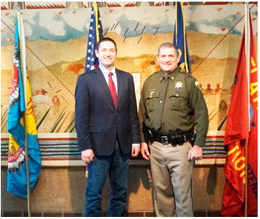Former Chief Of Highway Patrol Sues Attorney General Knudsen


Former Montana Highway Patrol Col. Steve Lavin filed a lawsuit Friday, Sept. 27, alleging Attorney General Austin Knudsen unlawfully forced him to resign and misrepresented the terms of his employment. The attorney general announced Lavin’s retirement in March. Since early 2021, Lavin had served as head of the Montana Highway Patrol, a division of the Department of Justice under Knudsen.
However, the complaint filed in Lewis and Clark County District Court alleges Knudsen and the state of Montana wrongfully discharged Lavin after the former colonel launched a “management review process.”
“This process included an anonymous (workplace climate) survey of all staff of MHP,” the complaint said. “The survey results indicated, unsurprisingly, that some of the line patrol officers had negative views of their superiors in MHP and in the Attorney General’s Office — including defendant Attorney General Austin Knudsen himself.”
In an email, a spokesperson for the Attorney General disputed the allegation the retirement was forced.
“It had become clear that MHP had lost confidence in Col. Lavin,” said Emilee Cantrell, with the Department of Justice. “As a result, Attorney General Knudsen and Col. Lavin came to a mutual agreement that Col. Lavin would retire to allow the MHP to move forward in a new and positive direction. Beyond that, we cannot comment on personnel matters or pending litigation.”
Knudsen has not responded to previous questions from the Daily Montanan about the survey through questions to his spokespeople.
Last month, the Daily Montanan obtained a copy of the survey and published it. Knudsen’s office threatened legal action in a cease-anddesist letter, which the news organization has resisted.
In an interview, Lavin said a national consultant hired to lead the Montana Highway Patrol through the management training informed division leaders the results of the survey, which included criticisms of the brass, weren’t unusual.
He said Eric Murray of Team Training Associates said the survey responses generally mirrored results from other law enforcement agencies outside Montana, and in some cases, were even better.
But Lavin, represented by Delli Bovi, Martin and Reed of Helena, alleges Knudsen called him into a meeting after the AG learned of the critical survey results.
“With neither warning nor cause, defendant Knudsen gave Col. Lavin the option of resigning or being fired,” said the complaint. “Because Col. Lavin had had no notice of this, his vehicle and other issued equipment were at his residence; defendant Knudsen had one of his minions escort Col. Lavin home, where, in full view of the public, he required Col. Lavin to surrender his MHP equipment.”
The lawsuit also alleges fraud, public policy violations, the infliction of emotional distress, and loss of potential retirement earnings as a result.
The complaint additionally argues the colonel of the Montana Highway Patrol can’t be terminated without cause and due process, according to state and federal law, respectively, and contrary to Knudsen’s representations.
On or around Jan. 1, 2021, when Knudsen appointed Lavin chief of the Montana Highway Patrol, the AG required Lavin to “sign a document indicating that Col. Lavin served at the pleasure of defendant Knudsen,” the complaint said.
But in requiring him to sign the letter, Knudsen “willfully deceived” Lavin, said the lawsuit.
The law says otherwise about terms of employment, according to the complaint, citing Montana code: “The attorney general shall select a highway patrol chief who must have the rank of colonel and shall hold office until the appointment has terminated for cause.”
On or around March 15, Lavin was called to meet with Knudsen, a human resources officer, and others, the complaint said. It said he was told to resign or be terminated, but without explanation.
“When Col. Lavin asked why he was being fired, he was informed that they did not need a reason to fire him because he worked at the pleasure of defendant Knudsen,” said the court document. “Defendant Knudsen and his human resources and legal staff knew, or should have known, that this statement is false; Col. Lavin did not.”
Lavin asked for the weekend to think over the decision or a chance to appeal, according to the lawsuit, but Knudsen denied the requests and told him he needed to make the decision immediately.
In an adjacent room, Lavin tried to contact attorneys he knew, but he couldn’t reach anyone and also realized he didn’t know the best person to contact, the complaint said.
“Col. Lavin knew this forced resignation was contrary to law, but feared further reprisal, such as the threat of losing his retirement and benefits after 32 years of service, so he signed the provided resignation form,” the lawsuit said.
It said he was also forced to sign an employment severance agreement that required “his unconditional release of any claims against” Knudsen and the state as well as nondisclosure of “any information acquired during his employment.”
Lavin had joined the Montana Highway Patrol in 1992 and climbed the ranks, according to the complaint. It alleges Lavin had “29 years of unblemished service” when he was selected in 2021 as chief of the agency and promoted to the rank of colonel.
Shortly after he was appointed to lead the agency, and in consultation with the management team, Lavin decided it would be helpful to hire a management consultant, the lawsuit said. It said the chief deputy attorney general approved the contract later that same year.
The first step was a climate assessment, or survey of all staff, initiated in early 2024, the lawsuit said. It included quantitative and qualitative results, statistical reports of answers, and also anonymous narrative results.
“On or about March 4, 2024, Col. Lavin, his second in command, and Dr. Eric Murray were called in to meet with defendant Knudsen and his minions, at which time defendant Knudsen expressed his displeasure with the survey results, particularly with the narrative portion of those results and with the parties involved in it,” the complaint alleges.
Some of the patrol officers shared negative views of their superiors in the Montana Highway Patrol and in the Attorney General’s Office, including allegations agency managers and some staff in the AG’s Office were “engaged in acts and practices that violated public policy.”
On or around March 14, Knudsen called Lavin and insinuated he had “leaked” information about the survey to the press because the Attorney General’s Office had received a public records request, the complaint said.
On March 15, Lavin was called into a meeting where he was given the choice to resign or be terminated, the complaint said. It said he chose a “voluntary” termination as the only reasonable option, and the discharge was not for good cause.
“This ‘voluntary’ termination was nevertheless a constructive discharge; Col. Lavin did not resign willingly,” the lawsuit said. “The discharge was in retaliation for Col. Lavin’s refusal to violate public policy or for reporting a violation of public policy.”
The forced resignation violated personnel policy, deprived Lavin of a reasonable opportunity to remain employed with the state, and cost him significant money, not only wages and benefits, but lost investment interest from a special retirement account, the lawsuit said.
The Deferred Retirement Option Plan allowed Lavin to contribute an extra $5,800 per month into an account at 7% interest for a period of five years, and he lost the final year of compounded interest, according to the timeframe outlined in the lawsuit.
“Defendant Knudsen engaged in actual fraud or actual malice in this discharge,” the complaint said. It said he acted “intentionally or recklessly,” his conduct was “extreme and outrageous,” and Lavin experienced emotional and physical distress as a result.
The lawsuit asks the court for punitive damages, reinstatement of his position and lost payment, attorney fees and costs, and “all other relief appropriate under the facts and law.”


